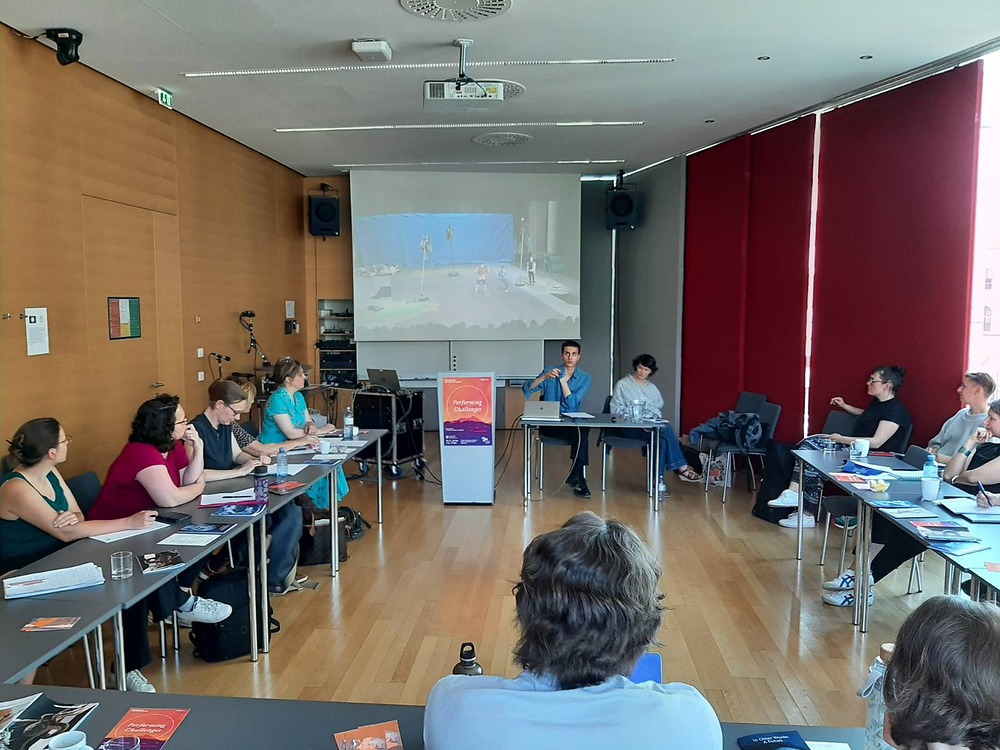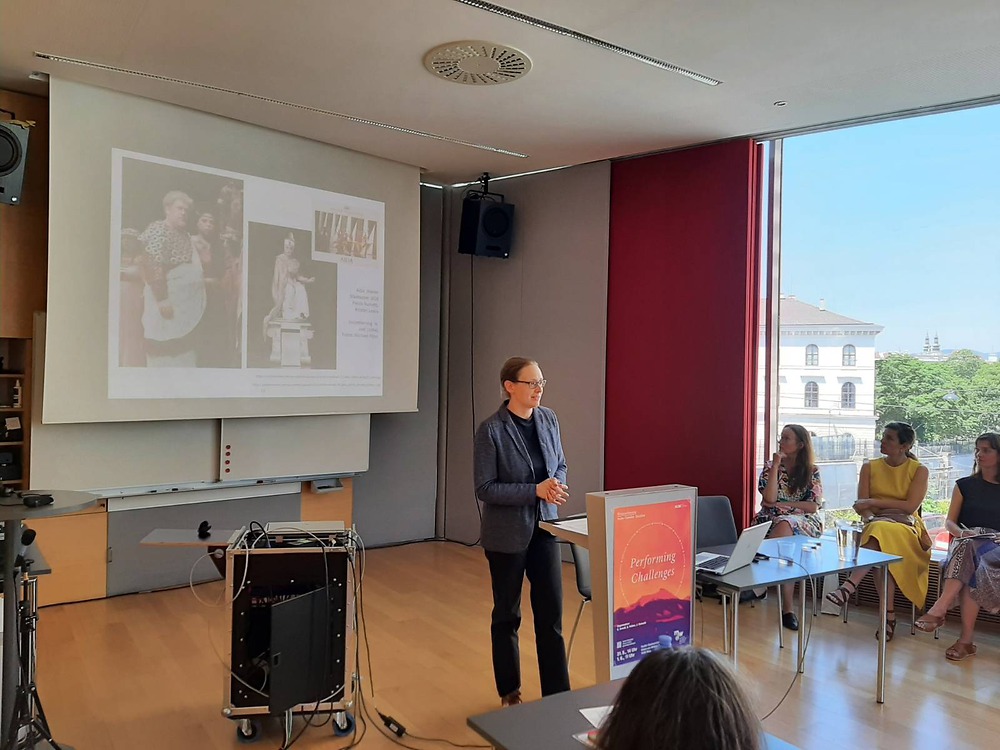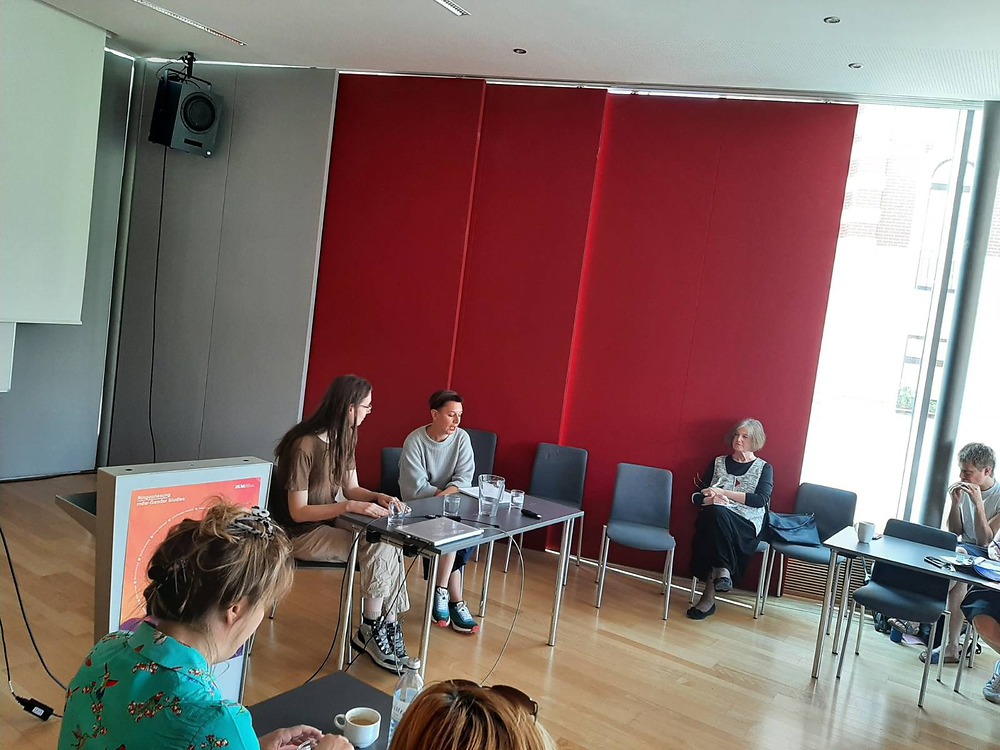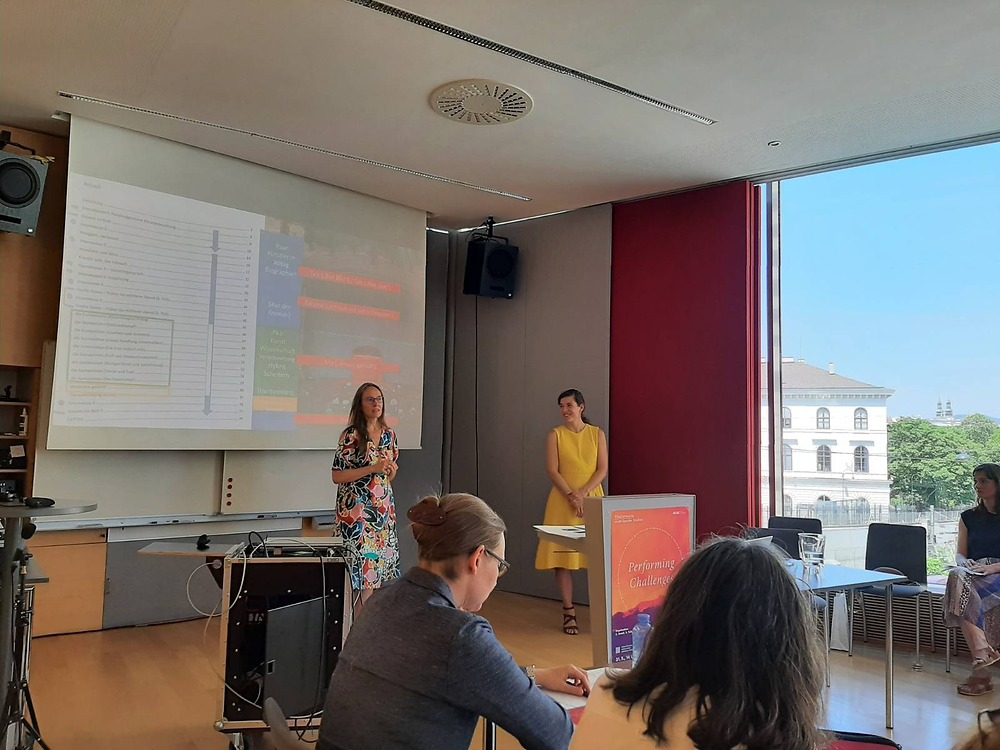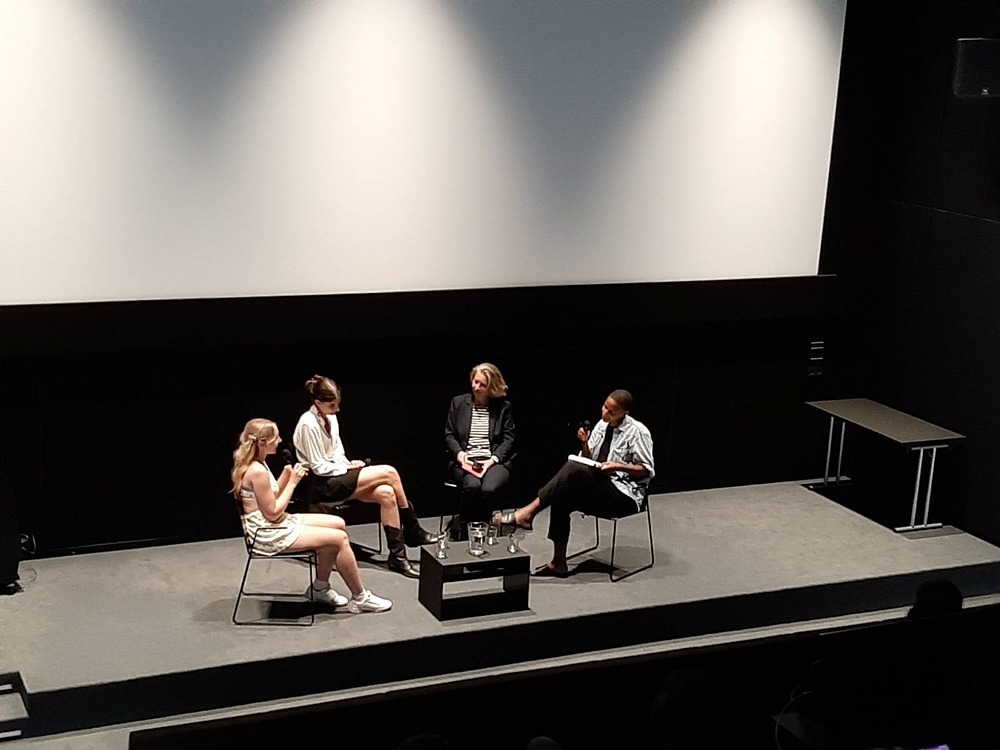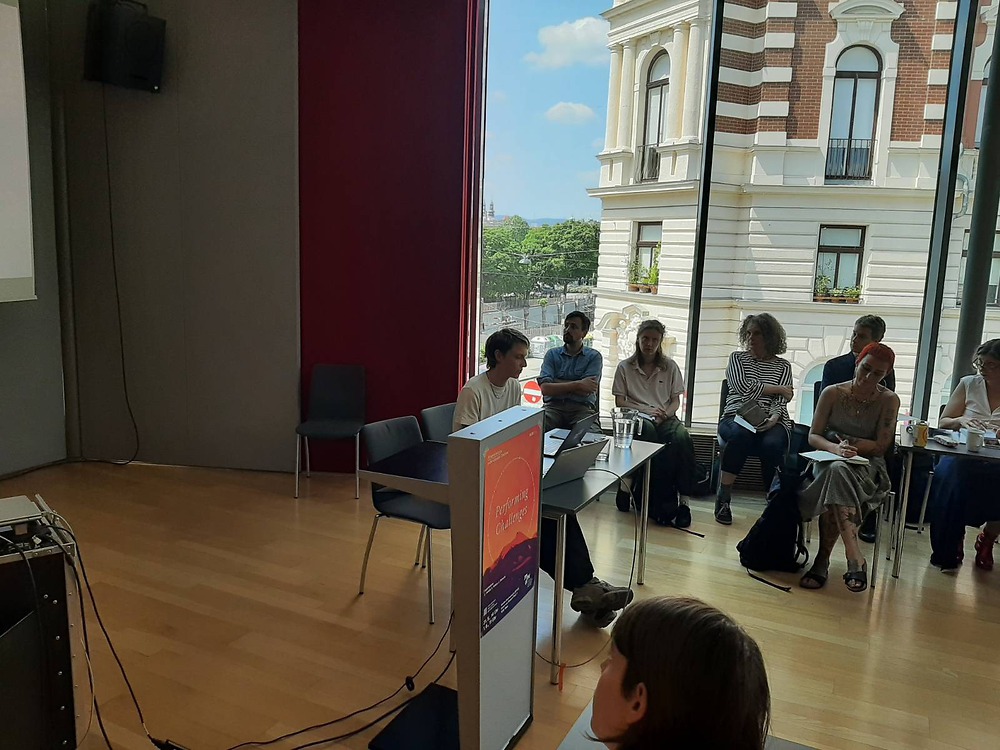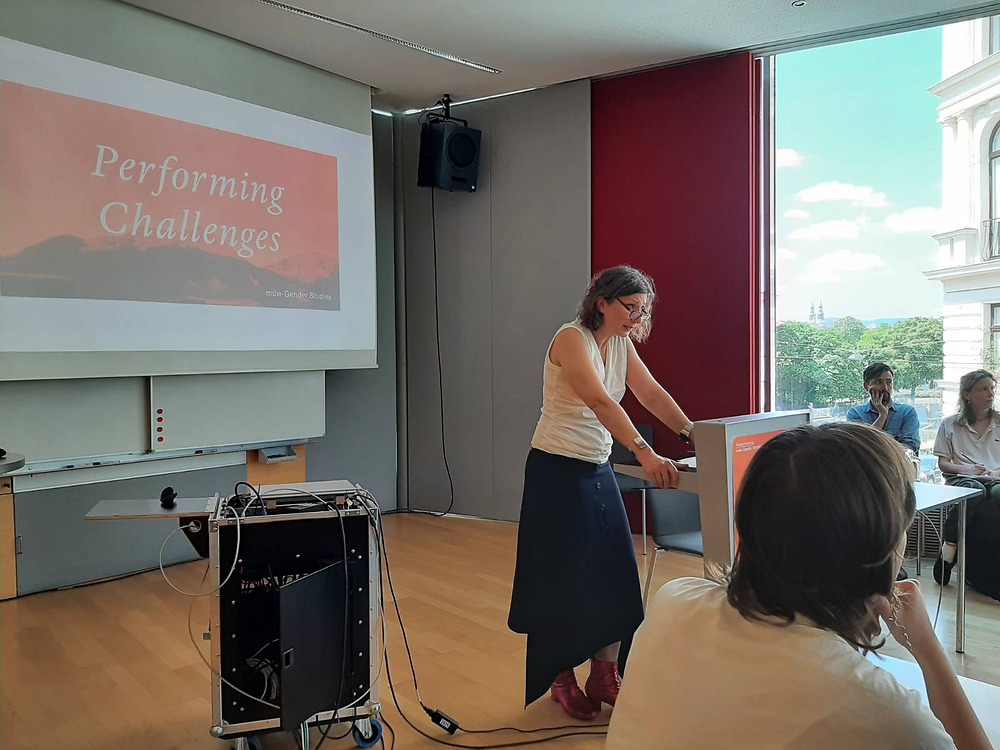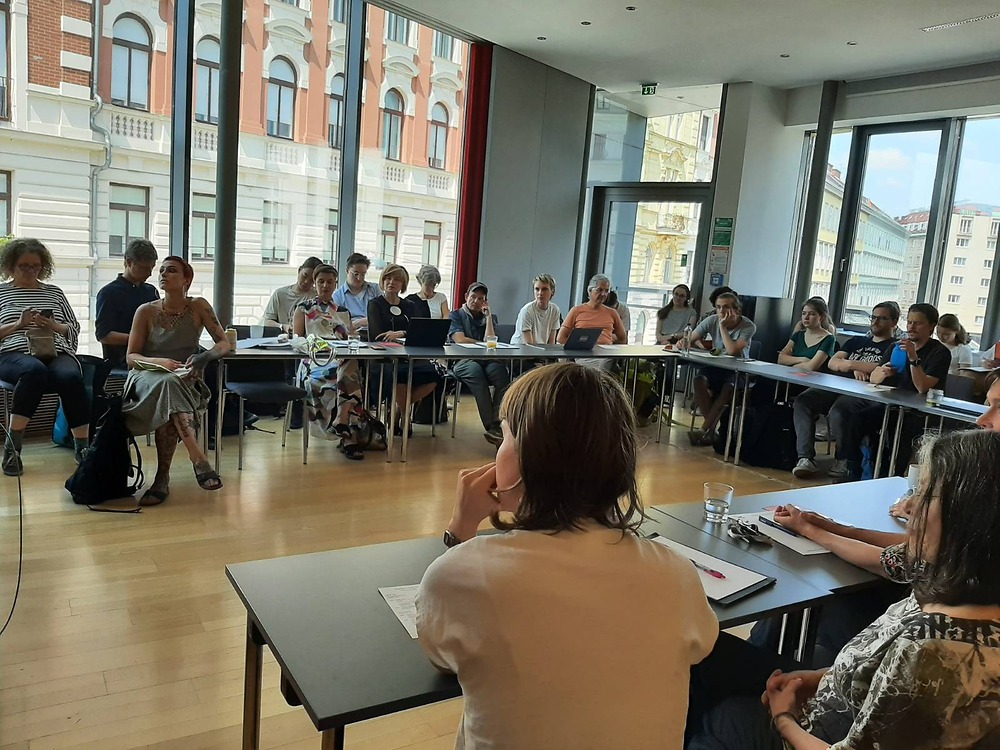Performing Challenges
Lecture Series, 31.5. and 1.6.2023
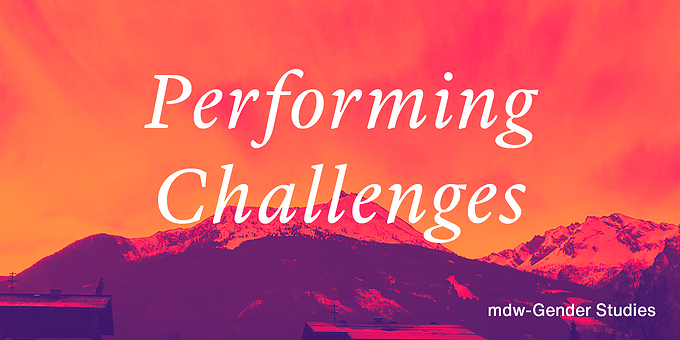
IKM – Institut für Kulturmanagement und Gender Studies
Universität für Musik und darstellende Kunst Wien
Anton-von-Webern-Platz 1, Bauteil E, 1030 Wien
The mdw Gender Lecture Series 2023 at the IKM explores the relationships between performing arts and interdependent social, political, and ecological challenges. Challenge is meant here in the literal sense of a questioning or doubting, but also as a suggestion, invitation, provocation, or taking on. We want to ask, on the one hand, how current global challenges find form in the arts, that is to say, how they are performed, and on the other, how performative practices themselves challenge, invite, and potentially provoke change. In this context, it is the aesthetic means and conditions of performing today, situated at the intersections of performing arts, activism, politics and theory, that are to be at the centre of our joint engagement with and discussion of gender issues.
We will accordingly bring together theoretical, artistic, and activist approaches that engage various examples from the fields of music, theatre/performance, dance, film, and activism to examine the current location of performing arts, as well as the relationship and its entangled inequalities between queerfeminist, migrant, and ecological-planetary perspectives in the context of current developments related to globalisation.
| Wednesday, 31 May |
| 2 p.m., Large seminar room at the IKM (E 0101) |
| 14:00 |
Introduction Evelyn Annuß, mdw-Gender Studies |
|
Performance and Film |
|
|
Challenging the Body-Image – Performing t4t Sima Ehrentraut |
|
| 15:00 |
Justitia! Performative Formats in/on Law and Justice Gin Müller |
| 16:00 | Pause |
| 16:30, Arthouse Kino in the Future Art Lab |
| 00:00 |
Greeting Gerda Müller, Vice Rector for Organisational Development, Gender & Diversity |
|
Filmscreening: Sonne (Kurdwin Ayub) Followed by Djamila Grandits in conversation with Maya Wopienka, Law Wallner, and Sonja Hilberger |
|
| Drinks and light refreshments on the terrace of the Future Art Lab |
| Thursday, 1 June |
| 10 a.m., Large seminar room at the IKM (E 0101) |
| 10:00 |
Student breakfast |
| Music Theatre | |
| 11:00 |
Humanistää! A Couple’s Life as a Staccato Performance Melanie Unseld and Jera Petriček Hrastnik |
| 12:00 |
Paris, Memphis, Versailles – Localisations of Gender in Music Theatre Anke Charton |
| 13:00 | Break |
| Inter- and Eco-dependencies | |
| 14:30 | Chris Standfest and Sean Pfeiffer |
| 15:30 |
Über(k)leben!Superglue Survival! Performative Forms of Protest and the Climate Crisis Martha Krumpeck (Last Generation) in conversation with Silke Felber |
| 16:30 | Coffee break |
| 17:00 |
Isabel Kranz |
| 18:00 |
On the politics of entanglement: feminist art and my grandmother's knitting Bojana Kunst |
Challenging the Body-Image – Performing t4t, Sima Ehrentraut
The lecture explores the role of visual processes of exchange in trans for trans* dynamics. Examining the 2021 cinematic work Seek Bromance by the artist and filmmaker Samira Elagoz, the presentation asks how desire for the other, for the other body, and for fixation within the image are intertwined through visual medialisation. In dialogue with the artistic work, the lecture explores the role of transmission and circulation in and between images for the formation of trans* identity and trans* relationships and explores the body-image as an in-stable site of manifestation of trans* becoming and of the reconfiguration of self-perception and perception by others in the outwardly turned gaze.
Sima Ehrentraut is a research assistant and completing a Ph.D. in the FWF project “Dramaturgies after Postdramatic Theatre” at the Institute for Theatre, Film and Media Studies at the University of Vienna. He also works at the cluster of excellence “Temporal Communities” (FU Berlin). His research focuses on performative dynamics of time-based media, media ontologies, and aesthetic concepts in the field of queer and trans studies.
Justitia! Performative Formats in/on Law and Justice, Gin Müller
The lecture provides insight into the approaches and themes of the multiyear research project Justitia!, which explores the relationship between theatre and courts of law, and between law and justice, in a number of different performances and media formats, in addition to social media, workshops, and lectures. It began in 2022 with the performance “Identity Cases – Identity Processes”, which shifted the dispute over identity politics into specific court settings represented in various media. Has the public conflict over fluid and fixed (trans/gender/racial) identities not long since, and often, become a court of law itself? How might the demand for law and justice be enacted and asserted? Is it all just performance or is it politics? In 2023, the theme is “No one is illegal”. The performance will focus, in a setting that is at once a court and a puppet theatre, on border violators, on asylum laws, and on helping refugees as care work.
Gin Müller is an artistic researcher, queer ar/ctivist, and dramaturge who is currently a lecturer at the University of Vienna (theatre, film, media studies), in addition to numerous theatre/performance/art/activism projects of his own (mainly in cooperation with the brut Theater Wien). From 2017 to 2019, he held the position of visiting professor at the Academy of Fine Arts.
Filmscreening Sonne (Kurdwin Ayub)
Three Viennese teenage girls twerk in hijabs and sing a pop song. A YouTube video of this made them famous overnight, especially among Kurdish Muslims. Yesmin, who is the only one of the friends who is Kurdish herself, begins to distance herself more and more from her culture. Nati and Bella, however, seem fascinated by this other world so alien to them. When the girls meet two young Kurdish patriots, the situation threatens to escalate. A film about young people between social media and self-discovery – a story of girls who are rebels.
Followed by Djamila Grandits in conversation with Maya Wopienka, Law Wallner, and Sonja Hilberger
Maya Wopienka is an actress who made her cinema debut in 2022 with the multi-award-winning film Sonne by Kurdwin Ayub.
Sonja Hilberger has been professor of role design at the Max Reinhard Seminar of the mdw since 2022. She works as a director, author, festival director, producer, actor, and acting teacher for theatre and film, for institutions including the Theater 89 Berlin and the Compagnie-de-Comédie Rostock.
Djamila Grandits works as a curator and creator of other arts and culture events and a member of the CineCollective sharing responsibility for the artistic direction and management of Kaleidoskop Film and Freiluft am Karlsplatz. She is currently involved in the programming of DOK Leipzig, Berlinale Panorama, tricky women – tricky realities, and frameout – Open Air Cinema. She is also a member of the Nonfiction Commission of the Zurich Film Foundation. Djamila engages with entanglements and collective processes.
Humanistää! A Couple’s Life as a Staccato Performance, Melanie Unseld and Jera H. Petriček
The multi-award-winning production humanistää! eine abschaffung der sparten (humanistää! an abolition of the divisions) at the Volkstheater in Vienna (directed by Claudia Bauer) can be read and experienced in many ways: as a performance that transcends genre, as an homage to Ernst Jandl (and Friederike Mayröcker), or also as a “breathtaking theatrical immersion”, to quote the New York Times. It is also the performance of a creative couple looking for the rhythm of their own creation. The lecture explores traces of twofold creativity and a couple’s biography on stage, making especial use of musical elements that underlie the staging and the levels of musicality or sound within “humanistää!” (such as speech rhythms, the musicalisation of movement, and stage music). The lecture will be followed by a discussion with Jera H. Petricek, the director of humanistää!.
Melanie Unseld is professor of historical musicology at the University of Music and Performing Arts Vienna.
Jera H. Petriček is a freelance theatre director and, as of 2023, Maestra suggeritrice at the Vienna State Opera. She studied French, Russian, and orchestral conducting in Ljubljana and Vienna. Since 2021, Petriček has been completing a Ph.D. in musicology on the conductor Gertrud Herliczka under the supervision of Melanie Unseld.
Paris, Memphis, Versailles – Localisations of Gender in Music Theatre, Anke Charton
On 6 March 2023, @oper_stuttgart asked on Twitter: “Brainstorming round for the 2026–29 seasons. Any requests? Let’s hear them!”, to then announce the following day: “Right now there’s only one thing we can say for sure: There’s still not going to be any Aida in Stuttgart, not through 2029.” This reference to Aida, in less than 140 characters, makes up more than a programming statement. It also offers a starting point for an intersectional discussion of entanglements between the world of current music theatre and certain, well-established narratives. The aim will be to ask how the so-called core repertoire can be performed – and about the risks it can in turn provoke.
Anke Charton is assistant professor of theatre & society at the University of Vienna and Elise Richter Fellow at the FWF. Her research investigates the interdisciplinary field of theatre and music studies in addition to gender studies, with a focus on musical theatre and performance, vocal history, and theatre cultures of the early modern period.
What Leaf? What Mushroom? - Chris Standfest and Sean Pfeiffer
“In Other Words: A Future” – this is the title of a collection of performances, panel talks, and readings that took place in the summer of 2022 as part of the ImPulsTanz – Vienna International Dance Festival. The events asked how current positions in the performing arts, literature, architecture, and activism shape and change perception and forms of understanding that actively intervene into what they grasp, in relation to what is so beautifully – and euphemistically – dubbed “climate change”. Works to be examined include those by creators such as Claudia Bosse, Stefan Kaegi & ShanJu Lab, Sergiu Matis, Elisabeth Tambwe, Esther Kinsky, Barbara Frischmuth, and others, with a focus on their force as interventions and their artistic methods. The presentation also discusses Angela Schubot and Lisa Hinterreithner and their somatic-discursive choreographic interweavings.
Sean Pfeiffer, co-curator of the symposium “In Other Words: A Future”, writes – and studies – language arts at the University of Applied Arts in Vienna.
Chris Standfest studied at the FU Berlin and the University of Lancashire. She is artistic advisor, dramaturge, and curator of ImPulsTanz – Vienna International Dance Festival and external lecturer at the University of Vienna. Both before and alongside these positions, she has gained many years of practice as a performer and dramaturge in the independent arts scene, above all with theatercombinat and Claudia Bosse, as well as in artistic and activist collective contexts in Berlin, Vienna, and other locations.
Über(k)leben! – Superglue Survival! Performative Forms of Protest and the Climate Crisis, Martha Krumpeck (Last Generation) in conversation with Silke Felber
Martha Krumpeck co-founded the Last Generation in Austria. She glues herself to streets to wake up politicians and society in the face of the looming climate catastrophe and scientific warnings that are increasingly urgent. In addition, she is a trans activist committed to the rights of gender minorities.
Silke Felber is a scholar in theatre studies and cultural studies who has completed a second dissertation qualifying her as a university lecturer. Among other topics, her research examines dramaturgies of persistence, aesthetics of endurance, and olfactory performativity. At the IKM she currently heads up the FWF project “Performing Gender in View of the Outbreak.”
Mediality of the Floral, Isabel Kranz
Flowers appear either as radically singular or in a collective; they stand for disembodied love or sex and sexuality per se; they symbolise pure nature or absolute artifice; they are insignificantly secondary or absolutely decisive. Understood as critical figures of thought, flowers and blossoms unsettle dualistic thinking and challenge all-too-simple oppositions. What is crucial here is their constitutive interstitial status – between object and subject, model and intuition, nature and culture, a mere thing and a living being. The lecture analyses examples from literature, art, aesthetic theory, and the history of science in botany to explore the mediality of the floral, focusing especially on questions of order, language, and gender.
Isabel Kranz is a scholar in literary studies and cultural studies and currently visiting professor at the University of Art in Linz and lecturer at the University of Vienna. Her books and other writings include Sprechende Blumen: Ein ABC der Pflanzensprache (2014) and Raumgewordene Vergangenheit: Walter Benjamins Poetologie der Geschichte (2011). Her research focuses on literature and botany, imagining the future, and media of history.
On the politics of entanglement: feminist art and my grandmother's knitting, Bojana Kunst
In ecofeminist art and theory, entanglement is often a key concept with political and ethical potential. It is a concept that expresses an ethics of care for the complexity of interwoven relations between human and more than human beings. At the same time, entanglement brings into focus a whole range of very specific practices, such as knitting, weaving and sewing. The relationships are often described in terms of threads, lines, knots, strings. In order to show how entanglement is politicised and materialised in feminist art, I would like to address this very specific fiber and textile materiality of entanglement, and discuss it through the practices of weaving and knitting. To do this, my talk will attempt to stitch together my intimate memory of my grandmother's weaving and feminist approaches to weaving, asking different questions about the matter of thread and the entangled labour of the fingers.
Bojana Kunst is a philosopher, dramaturge and performance theorist. She is a professor at the Institute for Applied Theatre Studies at the Justus Liebig University in Giessen, where she directs an international master's programme in choreography and performance. She was a researcher at the University of Ljubljana and the University of Antwerp (until 2009), and later a DAAD guest professor at the University of Hamburg (2009 - 2012).
